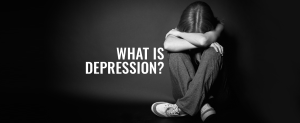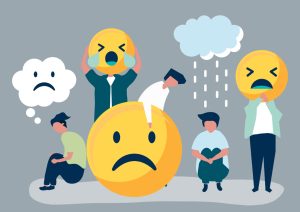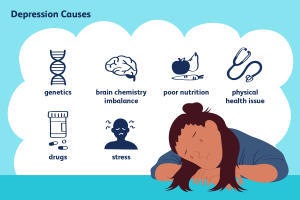Contents
- 1 What Is Depression?
- 2 Common Symptoms Of Depression
- 3 Symptoms Of Depression In Teenagers
- 3.1 1. Sudden changes in mood or behavior
- 3.2 2. Lack of interest in things they used to enjoy
- 3.3 3. Not taking care of themselves
- 3.4 4. Loss of appetite
- 3.5 5. Not getting enough sleep
- 3.6 6. Losing interest in school or work
- 3.7 7. Withdrawing from others
- 3.8 8. Suicidal thoughts or behaviors
- 3.9 9. Alcohol and drug abuse
- 4 Symptoms Of Depression In Children
- 5 Tips For Recognizing Depression In Others
- 5.1 1. Think about the person’s overall demeanor
- 5.2 2. Think if the person is isolating
- 5.3 3. Observe changes in their eating habits
- 5.4 4. Notice any change in appearance or hygiene
- 5.5 5. Consider the possibility of substance abuse
- 5.6 6. Be aware of their sleeping habits
- 5.7 7. Pay attention to how they express their emotions
- 5.8 8. Consider their level of productivity
- 5.9 9. Notice if they are keeping busy
- 5.10 10. Check if they are having suicidal thoughts
- 6 Causes Of Depression
- 7 Treatment Of Depression
- 8 Conclusion
- 9 A Word From Therapy Mantra
What Is Depression?

Depression is a mental health disorder that can cause a wide range of symptoms. These symptoms may be difficult to identify, as they can vary from person to person. The article will explore some common signs and symptoms of depression, in an effort to help people become more aware of the condition.
Depression can be an invisible illness. Depression can manifest as many different symptoms, and it may not always be clear what the person is experiencing. The article will explore common signs and symptoms of depression, and offer some tips for those who notice troubling behavior in themselves or others.
Depression is a mental health disorder that can be difficult to understand. Without the right information about depression and its common signs and symptoms, it may be challenging to accurately identify what someone else might be experiencing. This article will examine some of the more common signs and symptoms of depression, in an effort to help people become more aware of the condition.
Common Symptoms Of Depression
 It can often be difficult to get a clear picture of someone’s emotional state just by looking at them. The myriad possible causes for depressed behavior means that each person who experiences depressive episodes could potentially display different behaviors depending on their specific situation and life circumstances. However, there are some behaviors that commonly indicate depression:
It can often be difficult to get a clear picture of someone’s emotional state just by looking at them. The myriad possible causes for depressed behavior means that each person who experiences depressive episodes could potentially display different behaviors depending on their specific situation and life circumstances. However, there are some behaviors that commonly indicate depression:
Continual sadness or feelings
One of the most common signs of depression is a feeling of sadness or emptiness that persists for a long period of time. This feeling can make it difficult for people to enjoy activities that they used to find pleasurable and can leave them feeling isolated and alone.
Inability to enjoy activities
Feeling down or “blue” for prolonged periods of time can lead people to stop finding joy in previously enjoyable activities. This loss of interest in fun things, known as anhedonia, is one of the classic symptoms of depression.
Trouble concentrating
Depression often causes extreme difficulty concentrating on schoolwork, job duties, or other responsibilities. It can also make it hard to focus on conversations with others and interact normally with family and friends. The sense that it takes a lot longer than usual to process information can leave individuals struggling to keep up with their everyday lives.
Self-loathing
It’s very common for people who are depressed to have feelings of self-loathing, guilt, or hopelessness. Individuals experiencing depression may feel worthless or helpless about their situation, believing that there is nothing they can do to help themselves improve their mental health.
Symptoms Of Depression In Teenagers

It’s important for parents and caregivers to be aware of the signs and symptoms of depression in teens. Many teenagers don’t exhibit any obvious outward signs that they’re depressed, but there are warning signs you should look out for. These can include:
1. Sudden changes in mood or behavior
Changes in mood or behavior can be one of the first signs that someone is experiencing depression symptoms. If you notice that your teen seems more irritable, sad, or angry than usual, it could be a sign that something is wrong.
2. Lack of interest in things they used to enjoy
If your teen is no longer interested in the activities they once enjoyed, it may be a sign that depression symptoms are interfering with their life. This could include going to favorite sports teams, playing musical instruments, or spending time with friends. If this happens over a long period of time and seems to come out of nowhere for no reason, it’s a good idea to talk with them about how they’re feeling.
3. Not taking care of themselves
Depression can lead people to neglect their personal hygiene or make poor choices surrounding food and sleep. If you notice that your teen isn’t dressing as well as usual or has stopped showering regularly, it be a sign that something is wrong.
4. Loss of appetite
If your teen isn’t eating much, it could be a sign that they’re struggling with depression symptoms. They may also only want to eat comfort foods (like ice cream) or stop eating completely. If you notice this behavior over an extended period of time without an obvious cause, it’s best to talk with them about how they’re feeling and encourage them to seek help.
5. Not getting enough sleep
Sleeping patterns are another change that can indicate that something is wrong. Depressed people often struggle with insomnia, which makes it difficult for them to get the restorative sleep they need on a daily basis. Additionally, sleeping too much is also common among those who are depressed because they may be struggling to stay awake during normal waking hours.
6. Losing interest in school or work
It can be challenging for teenagers who are experiencing depression symptoms to get up and go to school every day. Depression can also make it difficult for them to focus on their studies or do well in their classes, which can lead to difficulties at school or work. If your teen is no longer interested in attending school, you might need to take steps like consulting with teachers and counselors about how they’re feeling so they can get the help they need.
7. Withdrawing from others
When someone is experiencing depression symptoms, it can be hard for them to open up and talk about what they’re going through. They may start spending more time alone or pulling away from the people they care about in an attempt to cope with their symptoms.
8. Suicidal thoughts or behaviors
If you notice that your teen is talking about suicide or self-harm, it’s important to take action immediately. If you think they may be considering suicide, consider calling 911 or taking them to the emergency room immediately.
9. Alcohol and drug abuse
Teenagers often turn to substances like alcohol or drugs in an effort to cope with depression symptoms. They might start drinking heavily at home alone each night, for example, which can quickly become a dangerous situation if left unchecked. Substances are also used as coping mechanisms for anxiety, which is commonly alongside depression symptoms during teenage years.
Symptoms Of Depression In Children

Depression in children can look very different from depression in adults. While adults may appear to be sad or have a loss of interest in things they used to enjoy, children may show their depression through anger, acting out, or problems in school. It’s important to be aware of the warning signs of depression in children so that you can get them the help they need as soon as possible.
Some common symptoms of depression in children include:
- Acting out or being disruptive in school
- Having problems with friends or socializing
- Being angry or irritable more than usual
- Showing a lack of interest in activities they used to enjoy
- Having trouble sleeping or eating
- Sudden changes in mood
- Frequent physical complaints like headaches or stomach aches that don’t respond to treatment
- Problems at home or with other family members
- Persistent boredom and low energy levels
- Persistent sadness, tearfulness, anxiety, or irritability
- Loss of interest in school and poor performance in class
- Self-harm or thoughts of suicide 13. Talk about wanting to run away from home 14. History of substance abuse
- Difficulty concentrating
- Ongoing feelings of worthlessness, guilt, shame related to things happening around them
Tips For Recognizing Depression In Others

If you are concerned about someone else’s behavior, there are some important things you should keep in mind when trying to determine whether they might be experiencing depressive symptoms:
1. Think about the person’s overall demeanor
Depression often manifests as a general sadness or lack of engagement with others. You might notice that the person is not exhibiting any excitement for activities that used to bring them joy and doesn’t seem very interested in connecting with family members. They also may not be as responsive to attempts from those around them to help.
2. Think if the person is isolating
Another common symptom of depression is feeling a need to withdraw and become isolated from others. The person may stop spending time with family and friends, or begin sleeping more than usual – possibly even during the day. This lack of socialization can make it harder for people who are concerned about the individual’s behavior to determine if there is something wrong.
3. Observe changes in their eating habits
Depression often affects appetite, causing individuals to eat less frequently or sometimes even forget to eat at all. It also can cause cravings for foods high in sugar or fat, which can indicate that someone isn’t getting the nutrients they need.
4. Notice any change in appearance or hygiene
If the person you’re concerned about isn’t taking care of themselves physically, it could be a sign that there’s something wrong emotionally. One of the most obvious signs is when people neglect to take care of their daily hygiene routines. If someone who normally spends lots of time looking after how they dress and groom themselves suddenly doesn’t seem to care very much, it might be worth asking if everything is all right.
5. Consider the possibility of substance abuse
Depression can cause people to turn to addictive substances like alcohol or drugs in order to temporarily escape their emotional pain. Someone using these substances would likely show indicators such as intoxicated more frequently than usual or having an unusual interest in drinking or drugs.
6. Be aware of their sleeping habits
Depression can cause people to have difficulty falling asleep, staying asleep, and/or oversleeping. If the person you’re concerned about seems to always be exhausted, it could be a sign that they’re having trouble getting adequate sleep at night. These difficulties could also manifest through frequent napping during the day.
7. Pay attention to how they express their emotions
It’s common for people who are depressed to struggle with feelings of sadness, guilt, worthlessness, self-loathing, and hopelessness. Look out for signs that someone is expressing these emotions through things like crying jags or appearing emotionally “flat” or apathetic in conversation.
8. Consider their level of productivity
People who are severely depressed may have a difficult time getting anything done, either at work or around the house. They might constantly be late to work or for appointments and could miss deadlines without even realizing it. Someone who is experiencing depression may also neglect household chores, leading to an accumulation of dirty dishes in the sink, clutter collecting on tabletops, etc.
9. Notice if they are keeping busy
If someone you care about has become very “shut-in” lately, not wanting to leave home or participate in normal activities with friends and family members, this could indicate that they’re undergoing significant changes in how they feel about themselves and their place in society It’s possible that these feelings may be related to depression and other mental health conditions.
10. Check if they are having suicidal thoughts
If someone you care about seems to be considering suicide or hurting themselves, contact a helpline as soon as possible (1-800-273-8255). If you think the person may be in immediate danger, call 911 immediately. What should I do if someone I know is exhibiting these symptoms? It’s important that this person gets help right away because untreated depression can have serious consequences, including worsening of their mental state and putting them at risk for suicide. Reach out to your friend or family member directly to speak with them about how they’re feeling. It also might be worth reaching out to an authority figure like their therapist or primary care physician to discuss your concerns.
Depression is a mental health disorder that can cause a wide range of symptoms. These symptoms may be difficult to identify, as they can vary from person to person.
Causes Of Depression

Depression is a mental health disorder that can be caused by a number of different factors. Some of the most common causes include:
1. Genetics
Depression can be hereditary, meaning that it may be passed down from one generation to the next. If you have a family history of depression, you may be more likely to experience it yourself.
2. Trauma
Experiencing a traumatic event can cause someone to develop depression. This could be a single, catastrophic event like a natural disaster or assault, or it could be chronic stress caused by things like poverty or racism.
3. Hormonal changes
Changes in hormone levels can also contribute to depression. This might happen during times of major life changes like puberty, childbirth, or menopause.
4. Medical conditions
Physical illnesses or chronic pain can also cause someone to develop depression symptoms. For example, the link between cancer and depression is well-documented.
5. Medication side effects
Certain medications may have side effects that contribute to depression symptoms as a result of chemical changes in your brain. This might include taking drugs for seizures, high blood pressure, or heart problems, among others.”
Treatment Of Depression

There are a variety of different treatments available for depression. The most common treatment is antidepressant medication, but therapy and lifestyle changes can also be helpful in managing symptoms.
Antidepressant Medication
Antidepressant medications are the most commonly prescribed treatment for depression. These drugs work by altering the levels of chemicals in your brain that contribute to depressive episodes. There are a variety of different types of antidepressants, so it’s important to work with your doctor to find the medication that’s best for you.
Therapy
Therapy is another common treatment for depression. This involves meeting with a therapist on a regular basis to discuss your thoughts and feelings. This can be an effective way to manage symptoms and learn coping skills.
In addition to these two treatments, making healthy lifestyle choices may also be helpful. This includes things like exercising regularly and eating a balanced diet.
Conclusion
Depression is a mental health disorder that affects millions of people around the world. It can cause feelings of sadness, emptiness, and hopelessness that can last for weeks or months at a time. Depression symptoms can vary from person to person, but often include changes in mood, behavior, energy levels, and appetite. If you think you might be suffering from depression, it’s important to seek help from a healthcare professional. There are many effective treatments for depression, including therapy and medication. With the right treatment plan, you can manage your depression and start feeling like yourself again.
A Word From Therapy Mantra
Your mental health — Your psychological, emotional, and social well-being — has an impact on every aspect of your life. Positive mental health essentially allows you to effectively deal with life’s everyday challenges.
At TherapyMantra, we have a team of therapists who provide affordable online therapy to assist you with issues such as depression, anxiety, stress, workplace Issues, addiction, relationship, OCD, LGBTQ, and PTSD. You can book a free therapy or download our free Android or iOS app.


